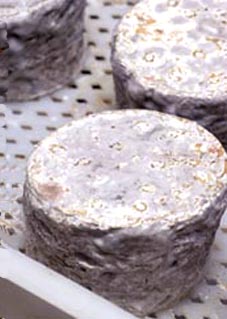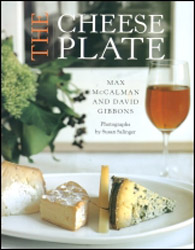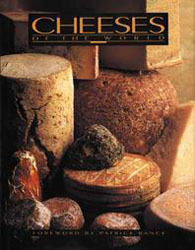Is Your Cheese Vegetarian?
At first glance, this seems an unusual question. Sure, an animal product—milk—is the basis of all cheese, but you don’t take an animal’s life when you milk it. True enough, but there’s another component of cheese, one most people don’t usually consider, that may render your beloved cheese a non-vegetarian product.
If you’ll recall, last month’s column discussed starter cultures, dairy bacteria added to milk to help coagulate it. This coagulation, which separates the milk into curds and whey, is an important initial step in cheesemaking. Most commercial cheeses add an enzyme-based substance called rennet to help this process along. The enzymes in rennet are chymosin and rennin, but those two words are often used interchangeably, and many people, even cheesemakers, just use the term rennet or rennin to describe any enzyme in cheesemaking that assists in milk coagulation. The problem here is that the traditional source of rennet is the membrane lining the fourth stomach of a calf (although rennin is also found in the fourth stomach of lambs, kids, swine, and other livestock), and you can’t get to that membrane unless the calf is killed.
Historically, all cheese has not been made with rennet. Over time, plants have provided some substances used in milk coagulation. These have ranged from fig tree bark extracts to the dried flowers of particular sunflower species to a solution made with stinging nettle. While all of these preparations would result in truly vegetarian cheese, they are impractical for commercial cheesemakers. Plants vary widely in chemical make-up, according to variables such as time of year, micro-environment, and weather conditions. Commercial cheesemakers need to be able to replicate their products consistently and reliably, and it would be extremely difficult to reproduce the precise composition and strength of any given lot of stinging nettle solution or to know what quantity of dried sunflower powder to use per batch of milk.
Does this mean you must give up cheese if you’re a vegetarian? Not necessarily. First of all, some cheeses do not require rennet for production. These include cottage cheese, ricotta, and some types of mozzarellas. Additionally, aside from animal rennet and vegetable coagulants (often referred to as “vegetable rennet,” though in fact they’re nothing of the kind), there are other kinds of coagulants now available. (Because this article is not meant for a dairy technology publication, I’ll refer to milk coagulants from now on as “rennets.”) |
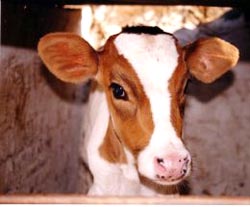
Some soft cheese are made from microbial rennets,
sparing calves, whose stomachs provide animal rennet. Photo by Vaughan Willis. |
Some soft cheeses use rennet produced from controlled fungus or bacteria fermentation, called microbial rennet. The chief limitations of microbial rennet seem to be their unsuitability for cheddar or other hard cheeses and their unintentional ability to freak out American consumers seeing the word “microbial” on a food label. But, again, what if you’re a vegetarian who likes a good cheddar?
In 1990, after a review of more than two years, the FDA approved a bioengineered form of rennin, made by inserting a calf’s prochymosin gene into a microorganism. This “microbial chymosin” was considered a great boost for the cheesemaking industry, which had suffered for years from an inconsistent supply of calf rennet. According to Whole Foods Markets, some 50% of the chymosin used is now produced via this bioengineering, and approximately 70% of cheese produced in the US is made with microbial chymosin. This type of coagulant can be used successfully for many cheeses, including hard cheeses.
How Can You Tell?
This still leaves vegetarian cheese-lovers with a problem: determining which cheeses are produced from animal rennet, and which are animal-rennet-free. Currently, the FDA does not require cheesemakers to specify the type of rennet they use. More confusing still is the fact that some cheesemakers blend different rennets to achieve their distinctive products, so a cheese might contain microbial chymosin as well as calf rennet. The most common circumstance is that rennets will simply be listed as “enzymes”. A very conscientious cheese buyer might try to track down the enzymatic sources of the cheeses they’re considering purchasing, but that’s not always easy, it’s time-consuming, and it means you can’t buy the cheese immediately, when you need it for a recipe or want it for a snack.
Luckily, there are at least a couple of sources to simplify the cheese selection process for vegetarians.
- Trader Joe’s lists cheeses they sell according to the type of rennet they contain. On their website, www.traderjoes.com, click on “Using Our Products,” then scroll down until you see “Rennet.”
- The website http://cheese.joyousliving.com lists cheeses by company, and tells which of a cheesemaker’s products are vegetarian-friendly.
- And www.cheese.com/vegetarian.asp has a long list of vegetarian, not always commonly found, cheeses.
It takes a little extra effort and research, but non-animal-rennet cheeses are available to those willing to search for them. Vegetarians needn’t forego a food that is both a pleasure and a valuable addition to the diet!
|


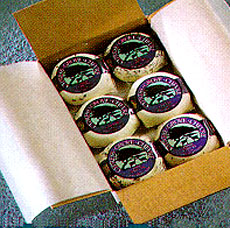 Vegetarians can still eat great cheese—these chevres from
Vegetarians can still eat great cheese—these chevres from 
